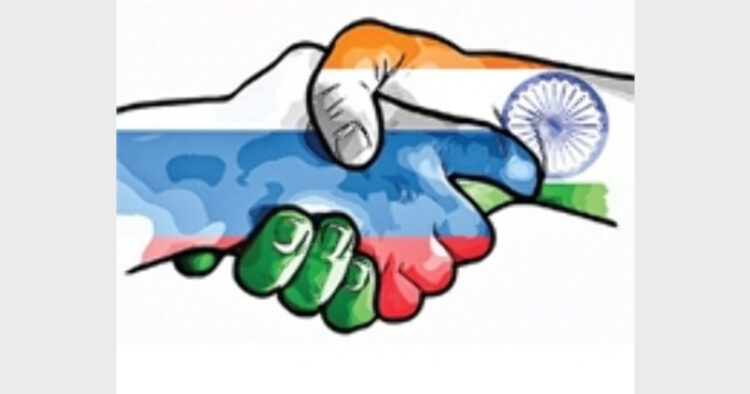Analysis: Russia’s Balanced Approach (MAY BE???)
Russia’s Balanced Approach (MAY BE???)
Intro: Russia is eyeing a new “strategic vision” of bilateral cooperation with India in areas like nuclear energy and hopes this will be taken forward during President Vladimir Putin’s visit to India later this year for the annual summit between the two countries.
When the Sun of New Government was rising in India, I was in Moscow. Next day when I met some local officials, they were unwilling to talk, but my Russian friend persuaded them to talk to me. We met over a cup of Tea. After initial formalities, I asked them, how they feel about New Indian Government (Bharatiya Janata Party) which is Non-Congress, and which was in opposition all these years. They said they welcome the new government in India and expressed the view that Russia should approach India vis-a-vis Pakistan and China with a balanced approach. I was surprised to hear the word ‘Balanced approach’. When I asked them to elaborate their relations with China and Pakistan, they told me, Russia is planning to make Metro in Pakistan and help in extension of Karachi Steel Plant. They told that Russian President Vladimir Putin has recently visited China and the Chinese companies have expressed keen interest to invest hugely in Russia.
|
Russian officials said India is diverting attention to West, even though Russia has always been India’s Partner in Basic Infrastructure and Defence Industry. They said that India’s approach towards Ukranian problem is not very clear and we are not satisfied with it. They said that India’s Prime Minister Narendra Modi has travelled to Russia twice, and his views about Russia were positive.
About their relationship with Pakistan and China and their strategic relationship with India, I asked them to talk a little about ‘balanced approach’? They (Russians) said they are afraid of the present situation in Afghanistan and are double minded. On one side they dislike when America comes closer to Russia and on the other, they are unhappy with the fact that American troops are leaving Afghanistan. Russians have a fear that once Americans leave Afghanistan, Muslim extremists will enter Russia through former Asian Soviet Republic Route, which is used for Drug Trafficking. Now what we are looking at is how far India can stabilize Afghanistan, as India is helping a lot in development work in Afghanistan.
During my stay, I also came to know that Russian Government does not like Indian bureaucrat Nirupam Sen, because of his hard stand in Rupee- Ruble exchange trade.
According to Russians, relation between USA/ West and Russia are very bad and it will take at least 10 to 15 years to normalize. With the change of guard, Russia will definitely observed how far Indian government will be able to replace this gap, said the officials.
As far as Russians are concerned, I have explained their balanced approach view; on the other hand, Indian Diplomats’ assessment about Russians officials and politicians towards the new government is that India has got a strong leader with a clear majority now, and it is believed that decisions will be implemented from top to bottom quickly.
As Russia government share similarities with the new government in India, it is expected that in times to come to Indo- Soviet relationship will definitely improve.
When I asked Russian and Indian officials about the key issues likely to be raised by President Putin during his meeting with PM Modi following issues emerged.
1. To increase share of Russia in Swan Telecom and BARH Thermal Project.
2. Supply of Nuclear energy to India.
3. Pyramid Structure based Business Model.
4. Withdrawal of Russian Investment in Odissa base Titanium Plant.
Russian officials said they want to invest in steel Industry, Nuclear energy Projects, Defence, Telecom and energy related fields but they are apprehensive about Indian Tender Procedure and CAG. Their view was that if theIndian government wants their participation in these fields, then India would’ve to help in clearing these obstacles.
In Moscow about 40,000 Indians reside and most of them are students, who have gone there for higher studies. Indians in Russia feel that Indian embassy is not as strong as it was in 1990, as they have to face a lot of Visa problems after the 2008 Rule came into effect.
Indian community in Russia feels that Indian Ambassador should not be appointed from the bureaucratic community because they bound by rules and regulations have to observe protocol and therefore are not able to meet people and own ministers freely.
There is a communication gap with the military official and political bosses. If an ambassador is from the political community then he can meet political bosses directly and can help in improving mutual relations.
In Nepal too I gathered the same opinion. Nepali politicians too share this view. Indian community in Nepal feels because of appointment of Ambassador from bureaucratic circle, India’s effect on Nepal has diminished.
-Deepak Kumar
|
At the time of the 1917 Revolution, the Russian Orthodox Church was integrated into the autocratic state and contributed significantly to the Bolshevik’s (Communist party of Soviet Union) attitude to curb religion and control it. Gradually USSR became the first state that encouraged the ideology of elimination of religion and of its replacement with universal atheism. The communist regime further confiscated religious property, ridiculed religion, harassed believers, and propagated atheism in schools. Despite the ban, under the leadership of Swami Jyotirupanand, Bharatiya Ram Krishna Mission is working in Russia since 1991. One centre of mission is in St. Petersburg. (The writer is an independent researcher) |




 Deputy Prime Minister Dmitry O Rogozin was on his two day visit to India from June 18 to June 19 met PM Narendra Modi and External Affairs Minister Sushma Swaraj.
Deputy Prime Minister Dmitry O Rogozin was on his two day visit to India from June 18 to June 19 met PM Narendra Modi and External Affairs Minister Sushma Swaraj.









Comments